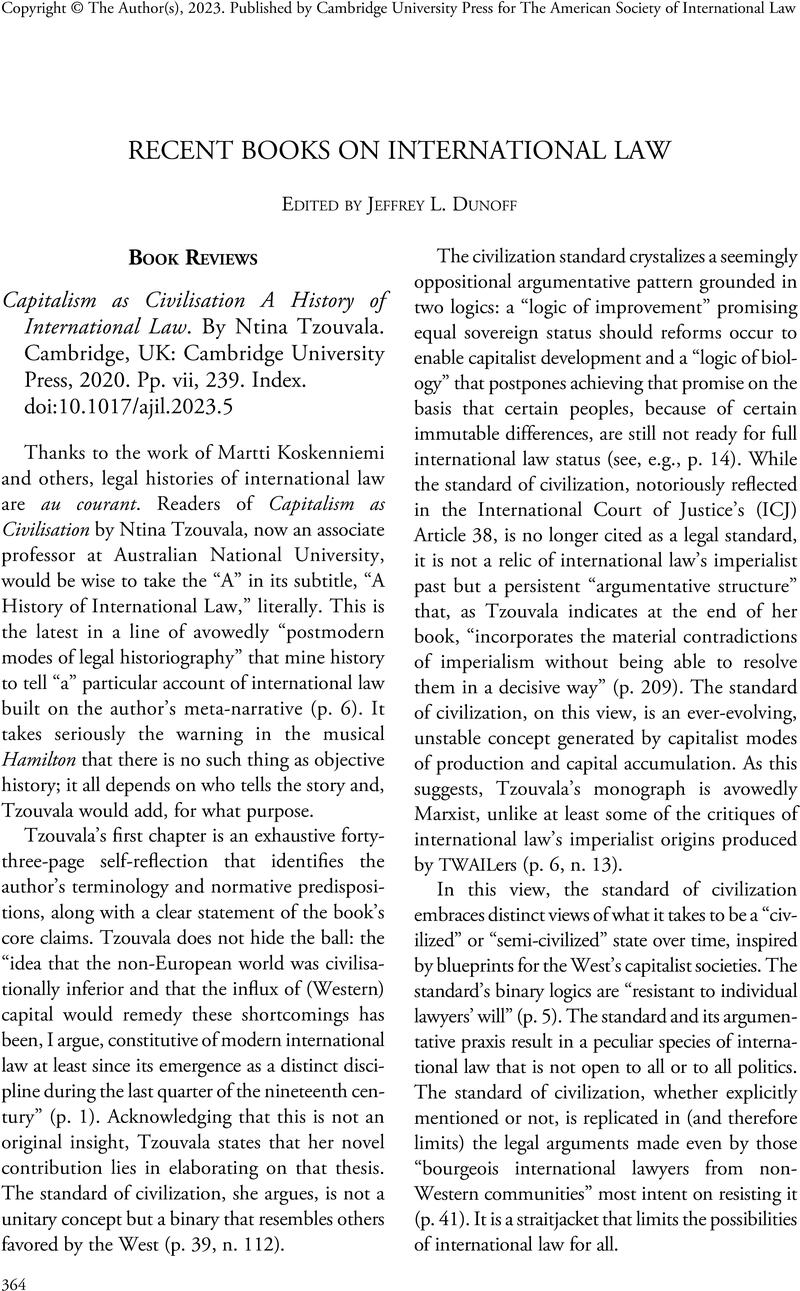No CrossRef data available.
Article contents
Capitalism as Civilisation A History of International Law. By Ntina Tzouvala. Cambridge, UK: Cambridge University Press, 2020. Pp. vii, 239. Index.
Review products
Published online by Cambridge University Press: 13 April 2023
Abstract

- Type
- Book Reviews
- Information
- Copyright
- Copyright © The Author(s), 2023. Published by Cambridge University Press for The American Society of International Law
References
1 ASIL 2021–2022 Book Awards Report, at https://www.asil.org/sites/default/files/ASIL%20Book%20Awards_release.pdf?v=20220128.
2 See, e.g., Edward W. Said, Orientalism (1978).
3 L. Paul Bremer III, My Year in Iraq: The Struggle to Build a Future of Hope (2006); Leonard Wood, Annual Reports, 1900, 1901, Havana, Cuba (Harvard Archives); see also Philip S. Foner, The Spanish-Cuban-American War and the Birth of American Imperialism, 1895–1902, Vols. 1, 2 (1972).
4 See, e.g., SC Res. 1373, pmbl. para. 9 (Sept. 28, 2001).
5 Compare Tzouvala, at page 218, criticizing liberal defenses of international law premised on equating imperialism with U.S. unilateralism.
6 “[N]eoliberalism is a model of capitalist accumulation that arose as a response to the Keynesian state and to 19th century laissez-faire liberalism and it rests upon the idea of generalized competition and state intervention for the construction, guarantee and expansion of these competitive relations in an ever increasing sphere of social co-existence, including the structure and functions of the state itself.” Tzouvala, Ntina, Chronicle of a Death Foretold? Thinking About Sovereignty, Expertise and Neoliberalism in the Light of Brexit, 17 Ger. L.J. 117, 120–21 (2016)Google Scholar.
7 Compare Martti Koskenniemi, Rocking the Human Rights Boat: Reflections by a Fellow Passenger, in The Struggle for Human Rights 115–17 (Nehal Bhuta, Florian Hoffmann, Sarah Knuckey, Frédéric Mégret & Margaret Satterthwaite eds., 2021).
8 Arnulf Becker Lorca, Mestizo International Law: A Global Intellectual History 1842–1933, at 269–85 (2014).
9 Id.
10 On the first, see, e.g., Mogami Toshiki, Japan, in The Oxford Handbook of International Law in Asia and the Pacific 320 (Simon Chesterman, Hisashi Owada & Ben Saul, eds., 2019); on the second see, e.g., Gary P. Leupp, Male Colors: The Construction of Homosexuality in Tokugawa Japan (1997).
11 See, e.g., Richard Swedberg, Tocqueville's Political Economy 259–60 (2009) (discussing the “Tocqueville effect” in which social frustration increases as social conditions improve as applied to the many events—spanning decades and including economic improvements—leading to the French Revolution).
12 See, e.g., UNCTAD, World Investment Report 2010, Investing in a Low-Carbon Economy (2010). That report argues, for example, that it was necessary to increase foreign direct investment flows by between $200 billion to $1.2 trillion per year to maintain greenhouse gas emissions at current levels in 2030. Id. at 111.




